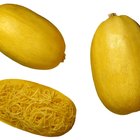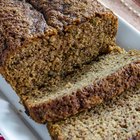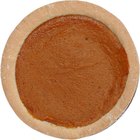Nungning20/iStock/GettyImages
If you've run out of potatoes or just want a change of pace, substituting butternut squash for the potatoes in beef stew makes perfect sense because it's also a winter food and easily available. Add an abundance of vegetables along with the squash, such as carrots and peas, and cut back on the amount of meat to create a stew that is both healthy and hearty. Because one butternut squash weighs from two to three pounds, use only part of it in the stew and save the rest for soup or a butternut gratin for a few days later.
Bigger Is Better
Like all winter squashes, butternut is best from late fall through early winter. Larger squash have more flavor than smaller ones, and those that are extremely hard are better than those that have some give when you press them. Look for those with an evenly-colored skin and a thick neck. Butternut squash lasts for months in a well-ventilated area and cool area. Once the squash is cut open, it lasts for three to four days in the refrigerator.
Golden Treasure
Butternut's golden-orange flesh gives beef stew an eye-appeal that isn't there with potatoes. When you mix butternut with bright orange carrots, brown beef and green bits of parsley sprinkled on after cooking, your stew brightens up a meal even before it's eaten. More flavorful than potatoes, butternut has an almost fruity flavor that adds a new dimension to beef stew. That said, its flavor is still milder tasting than acorn or Hubbard squash.
Balancing Your Sweet Tooth
Because a butternut squash contains more sugar than a potato, you need to balance it with acidic or slightly bitter ingredients to keep the sweetness from overwhelming the stew. The earthiness of herbs naturally counterbalances butternut's sweetness, so use a bit more bay leaf, sage or thyme than you normally would. After the stew finishes cooking, stir in a tablespoon of lemon juice or vinegar for an acidic finish that you won't be able to taste but that will make the stew taste better.
Down to Business
Unlike potatoes, butternut squash have very tough skins and hard flesh. To remove the skin and cut the squash, pierce the rind with a fork and microwave the squash for two minutes. Use your heaviest knife or cleaver and slice off the stem so you can set the squash flat. Then cut off the skin in long slices, and cut through the squash lengthwise before cutting it into 1- to 1 1/2-inch chunks. Simmer the squash in the stew until it is soft, for about 20 minutes.
Related Articles

How to Cook a Turban Squash

How to Cook Delicata Squash Cut in Half

How to Cook Zuccini & Squash in a ...

How to Cook Butternut Squash in the ...

How to Tell if Baked Spaghetti Squash ...

How to Cook Buttercup Squash
How to Grill Chayote Squash

Spaghetti Squash Cooking Tips

The History of Butternut Squash

How to Cook With Green Fuzzy Squash

How to Cook Papaya Pear Squash

How to Use Eggplant in Soup

How to Cook Sweet Meat Squash
How to Grill Spaghetti Squash

How to Thicken Mashed Squash

Baked Cubed Squash
What to Do With Leftover Spaghetti ...

When to Harvest Sweet Meat Squash?

Nutrition in Calabaza Squash
How to Cook a Large Hubbard Squash
References
- The Deluxe Food Lover's Companion; Sharon Tyler Herbst and Ron Herbst
- Vegetables from Amaranth to Zucchini; Elizabeth Schneider
- The Flavor Bible; Karen Page and Andrew Dornenburg
- How to Cook Everything Vegetarian; Mark Bittman
Writer Bio
Susan Lundman began writing about her love of cooking, ingredient choices, menu planning and healthy eating after working for 20 years on children's issues at a nonprofit organization. She has written about food online professionally for ten years on numerous websites, and has provided family and friends with homemade recipes and stories about culinary adventures. Lundman received her M.A. from Stanford University.